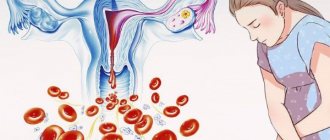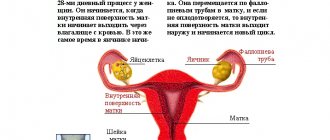After childbirth, the body adjusts to feeding the baby. Under the influence of the hormones prolactin and oxytocin, a nutrient fluid is formed and released from the mammary glands. However, along with this process, the restoration of the reproductive function of the young mother also occurs. Very often, women, observing the resumption of the menstrual cycle, begin to panic, not knowing whether it is possible to continue breastfeeding the child or stop breastfeeding for the period of monthly bleeding.
Is it possible to breastfeed during menstruation?
The content of the article:
To understand whether you can breastfeed during your period, let's look at a few fairly common misconceptions. They say that menstruation:
- It greatly changes the taste of milk, which is why the baby may simply refuse to take the breast. In fact, studies that have been conducted on this topic have refuted such information. Menstruation does not in any way affect any of the characteristics of breast milk.
- It provokes the production of a huge amount of hormones that will cause irreparable harm to the newborn. Firstly, they are already present in milk, moreover, the baby’s body needs them for proper development. Secondly, their number remains constant, without changing with the arrival of critical days.
- Changes the composition of milk, making it less healthy. The quality of breast milk does not change in any way during menstrual periods. It, as before, is the optimal nutrition for the child, satisfying all his needs at this stage of life.
- Significantly reduces the amount of milk produced. Accordingly, the newborn will not eat enough and will have to be fed urgently. It is quite possible that on the first day of menstruation, milk will actually become a little less due to hormonal fluctuations. However, after a couple of days, lactation will be fully restored; the main thing is to slightly support it, without panicking or adjusting the milk diet.
Restoring the functioning of the female reproductive function is not a reason to disrupt the natural feeding of the child.
Doctors are unanimous: it is possible, even necessary, to breastfeed during menstruation.
The only recommendation is to shower as often as possible on menstrual days, because... Many women suffer from profuse sweating. It is this that slightly changes the “mother’s smell”, causing the baby to be capricious and refuse to eat.
Why do menstruation disappear?
The feeding schedule is not always followed. Because of this, prolactin production decreases. Menstruation occurs when its level decreases, which is associated with a violation of the feeding regime. And when the frequency of application increases, menstruation stops.
Is it possible to breastfeed a baby during menstruation? The occurrence or absence of menstruation does not have any effect on this process.
To maintain high levels of milk in the breast and the hormone prolactin in a woman’s body, it is necessary to feed the baby at short intervals. Then the appearance of menstruation can be delayed.
If babies are fed with a bottle, the level of the hormone decreases, and the sudden onset of menstruation may disappear. If a woman experiences a similar situation, it means her hormonal balance has returned to normal.
Why don't my periods come?
Regardless of the method of delivery, immediately after the birth of a baby, every woman begins to experience bleeding, which is called lochia in medical circles. Their duration usually varies from 3 to 6 weeks (in rare cases it can reach two months). It happens that lochia subsides, and after a few days it begins with renewed vigor. Uninformed young ladies believe that it’s their period. In fact, you should not wait for the arrival of menstruation during the lactation period.
Everything is explained simply: in nursing mothers, breast milk is actively produced under the influence of prolactin, a peptide hormone that suppresses the synthesis of its steroid counterpart, progesterone. The latter is directly involved in the work of the ovaries, the formation of the egg, and is responsible for its readiness for fertilization. Doctors call the replacement of one hormone with another “lactation amenorrhea.” When progesterone in the body ceases to be generated, accordingly, there is no maturation of follicles, and menstruation does not occur during breastfeeding.
This phenomenon is temporary: as soon as the amount of prolactin decreases (often this happens during the introduction of complementary foods or at the end of breastfeeding), menstruation will soon begin.
Lactation and menstrual cycle
The cycle in women of reproductive age has different durations, which normally range from 21 to 35 days. It is known that the first day in the cycle coincides with the beginning of menstruation.
There are two phases in each cycle. During the follicular phase, several follicles grow under the influence of FSH, actively synthesizing estrogens. One follicle undergoes full development and becomes dominant. Hormones of the first phase are necessary for the growth of the endometrium, into which the fertilized egg is implanted after fertilization.
Approximately in the middle of the cycle, as FSH accumulates, a surge of LH is observed, leading to rupture of the membranes of the dominant follicle and the release of a mature egg. Fertilization can take place over the next 1-2 days. The follicle membranes contribute to the formation of the corpus luteum, which produces the pregnancy hormone progesterone. It supports the development of the embryo and fetus in the first weeks after successful conception. If pregnancy does not occur, the corpus luteum regresses before the next menstruation.
While breastfeeding, the nature of your periods changes. Lochia or postpartum discharge is not considered menstruation. In the absence of lactation or rare breastfeeding of the baby, menstruation may resume after the end of lochia.
When to expect your period while breastfeeding
For the most part, menstruation and breastfeeding are mutually exclusive processes. The likelihood of resumption of “red” days during lactation depends on the specifics and regularity of breastfeeding. Thus, the longest interval of life “without menstruation” (sometimes even up to two years after childbirth) is provided by:
- “on demand” regimen recommended by pediatricians;
- mandatory night feedings;
- refusal to supplement with water or supplementary feeding with formulas;
- The baby does not have bottles or pacifiers.
The female reproductive system, as well as hormonal levels, sometimes behave unstable, succumbing to the influence of the slightest external stimuli (for example, lifestyle, family circumstances, even the cultural characteristics of a particular country). Therefore, the norm of lactational amenorrhea is conditional; no gynecologist will be able to say for sure when a particular girl will resume menstrual bleeding.
According to the results of studies conducted by scientists from different countries, 37% of women in labor begin to menstruate in the second half of the year after the baby is born (in fact, after the introduction of complementary foods at 6 months), and 48% of girls began to menstruate only in the second year of breastfeeding. Menstruation may well resume during lactation - for 7% of nursing mothers, critical days come already in the first six months after childbirth.
When will the cycle be restored?
There are no strict norms for the resumption of menstruation, and at the same time the possibility of a new pregnancy. It all depends on whether the mother is breastfeeding or not. And also on the individual characteristics of the body. The appearance of menstruation (if the discharge is really menstruation and not postpartum complications) three weeks after birth and lactational amenorrhea lasting two years are two poles of the same norm.
During breastfeeding, menstruation usually resumes 11–18 months after birth. But sometimes - after 3 weeks or, at the other extreme, after 2 years.
In many ways, the timing of recovery of cycles depends on the organization of breastfeeding: frequent feeding of the baby to the breast helps maintain a high level of the hormone prolactin in the blood, which is responsible for suppressing ovulation. Long intervals between feedings, using a pacifier and supplementing with water limit the baby’s natural need for frequent sucking, and therefore lead to a more rapid decrease in prolactin levels. Conversely, intensive breastfeeding in the second year of a child's life increases the likelihood of a later resumption of menstruation.
Inna Vinnichenko
Obstetrician-gynecologist at the Ameda Family Clinic
What to do if cracks appear on your nipples - expert advice
Causes of menstruation
Menstruation during breastfeeding is by no means a pathology; in some girls it resumes within 2 months after birth. Doctors explain everything by saying that “hormone replacement” simply did not work.
See also: How long does the first menstruation after childbirth last?
Doctors say the main reasons why a woman may have periods while breastfeeding are:
- mixed feeding;
- the presence of water in the infant’s diet;
- rare attachments of the child to the mammary glands;
- refusal of night feedings;
- start of complementary feeding.
During the lactation period, girls taking hormonal and other medications, as well as those with weakened immune systems, should wait for their period. Among the probable causes of their occurrence is impaired production of prolactin. A timely visit to a gynecologist will allow you to determine what caused this and rule out a number of health problems.
My period has started - is my milk leaving?
Periods after childbirth while breastfeeding - when do they start? It all depends on the intricacies of the hormonal system of a particular woman. And also on the characteristics of breastfeeding, which she practices. Does the mother feed often (when the baby wants) or rarely (according to a schedule)? Does the baby give water? Does he supplement with formula? All these points affect the timing of the first menstruation.
A month after giving birth. Sometimes lochia, instead of stopping, begins to be released with greater force by the end of the 30th day. This phenomenon is often mistaken by women for early menstruation. Such cases are very rare, but nevertheless occur in medical practice.
In two to two and a half months. If a woman immediately switched the baby to formula, then with artificial feeding, menstruation comes quickly.
In three to four months. Menstruation with breastfeeding after four months is the norm and indicates good functioning of the pituitary gland of the nursing mother. This situation also occurs when the mother switches the baby to a mixed diet, that is, the baby eats both formula and breast milk at the same time, or when breastfeeding is curtailed completely.
In six to eight months. The most common time period during which the resumption of menstruation is observed during guarding. Most infants switch to complementary feeding, therefore, they ask for breastfeeding much less often, mainly before bed. Lactation gradually begins to decline, hormone levels tend to the previous “pre-pregnancy” levels. Sexual hubbub stimulates the production of eggs and provokes menstruation during breastfeeding.
When the baby turns one year old. Many mothers of one-year-olds begin to menstruate, even if lactation continues in full.
It happens that menstruation does not occur until lactation is complete during long-term breastfeeding (a year and a half or more). And they start a couple of months after the last application.
And all these situations are absolutely normal.
So when does your period start when breastfeeding after childbirth? There is no correct and unambiguous answer. It all depends on the intricacies of lactation and the female body.
If menstruation begins while breastfeeding, this does not mean at all that there will be no more milk and it’s time to switch the baby to formula. The amount of breast milk depends little on menstruation. Consequently, a mother can feed her baby until she deems it necessary to stop breastfeeding or until the milk disappears spontaneously. The menstrual cycle has nothing to do with this process.
Menstruation signals that the reproductive system is in order. The presence of discharge indicates a woman’s ability to have children; it is by this discharge that girls predict many processes in the body (for example, the onset of ovulation). At the same time, it is useless to guess when the first menstruation should begin after childbirth.
One of the common fears of nursing mothers when resuming cycles is a change in the taste of breast milk, which allegedly can lead to the baby refusing to breastfeed. But firstly, there is no reliable evidence of this fact, and secondly, minor changes in the taste of milk occur almost constantly depending on the range of products consumed by the mother. These changes are common for infants and do not in themselves lead to breast abandonment.
As for the influence of menstruation on the amount of milk, sometimes women actually experience a tendency towards a slight decrease in its production in the first days of the cycle. However, this is only a short-term phenomenon, and after a couple of days the amount of milk becomes the same. Based on this, we can conclude: the onset of menstruation is never the cause of a true lack of milk.
Remember that the necessary conditions for establishing the lactation process are frequent feedings during the day, the presence of night feedings and proper attachment of the baby to the breast, and the early arrival of the first postpartum menstruation does not in any way affect the success of the process. At the same time, lactation does not decrease, so any woman is able to breastfeed for as long as she and the baby want, regardless of the timing of the resumption of menstrual cycles.
Tired of breastfeeding: a specialist explained what to do
How does menstruation affect lactation?
Menstruation that comes during breastfeeding should not become a reason for transferring the baby to artificial nutrition. They do not affect the quality characteristics of milk - they do not change its color, smell, consistency, or composition. As for the volume, it may decrease slightly during the resumption of the cycle, so experts recommend drinking plenty of warm drinks and putting the baby to the breast frequently. Even if you ignore these tips, you should not expect problems with lactation due to the onset of menstruation - within 1-2 days the mammary glands will begin to produce a sufficient amount of milk.
What changes await me?
Don't worry if your discharge is lighter at first than before pregnancy and your cycles are irregular. This is a consequence of the work of the hormone prolactin. It is also possible that after several menstruation the cycles disappear again for some time. This can happen if, after a period of less frequent feedings, the baby again increases the frequency of breastfeeding (for example, during a growth spurt or intensive teething).
However, the environmental friendliness of breastfeeding is not the only factor influencing the restoration of cycles. It also depends on genetics and the natural changes in a woman’s hormonal levels depending on her age or current lifestyle. Even for the same woman, the timing of menstruation after each subsequent birth may differ.
Malfunctions of the menstrual cycle
The menstrual cycle restored after childbirth is an indicator that the reproductive system is ready to perform its functions with renewed vigor, and the woman is ready to become pregnant again.
However, while menstrual periods are stabilizing, many young mothers are faced with the phenomenon of irregular periods after childbirth. They do not surprise gynecologists and are even considered the norm. Doctors explain everything simply: the body is still recovering from long-term gestation and labor itself, and hormonal fluctuations provoked by lactation slow down this process.
Menstruation may begin during breastfeeding, and then disappear the next month; their duration, intensity, and degree of pain change/fluctuate.
The restoration of the cycle is influenced by many reasons: from the physical and psychological state of the nursing mother to complications that arose during childbirth. Normally, stabilization occurs within 2-3 months, after which menstruation becomes regular.
Another failure is considered to be a delay in menstruation during breastfeeding. Long-term lactational amenorrhea can be caused by:
- repeated pregnancy;
- hormonal imbalances;
- psycho-emotional disorders (so-called “postpartum depression”);
- weakened immune functions of the body;
- poor nutrition, violation of the postpartum regime;
- other factors.
Irregular periods during breastfeeding can sometimes be associated with gynecological diseases in a woman. However, only a qualified specialist can diagnose the pathology and make the correct diagnosis.
The main medical factors that provoke cycle disruptions are pathologies of the pelvic organs and tumors of the uterus/ovaries. Doctors consider diseases of the pituitary gland, present in conjunction with hormonal disorders of the body, to be a rare cause of lactational amenorrhea. Postpartum hemorrhage can provoke such a pathology.
See also: Causes of heavy periods after childbirth
What changes for a mother when menstruation returns?
It’s not only the child’s behavior and the fear that the baby will refuse the breast that worries nursing mothers with the onset of menstruation after childbirth. The fact is that many women note changes in their condition:
- there is a feeling of fatigue, fatigue, which lasts the first two days of the new menstrual cycle,
- within a few days the chest becomes full and painful,
- nipples are more sensitive: a nursing mother experiences unpleasant sensations and discomfort when the baby grabs the breast and begins to actively suck,
- feels irritated, desires to be alone with himself, to take a break from everyday worries and from caring for the baby.
Doctors are in a hurry to reassure: these are normal phenomena that you should not be afraid of or try to cope with by stopping breastfeeding. At this moment, another major hormonal change occurs in the body, signaling that reproductive function has been restored and the body is ready to conceive and bear a fetus. PMS (premenstrual syndrome) is expressed differently in every young mother: some say that its manifestations decreased significantly after childbirth, while others worry, because before pregnancy they practically did not encounter PMS symptoms.
The main thing to understand is that all changes in the body occur as they should. You need to wait quite a bit of time to adapt to the new state. Much depends on the mood of the nursing mother. If you stay positive, don’t get nervous, avoid stress and enjoy the process of feeding your baby, all negative symptoms will go away in one or two days.
Many women experience pain in the abdominal area on the first day of their period.
Some mothers feel guilty because they want peace and relaxation, but caring for the baby does not allow them to relax. Psychologists and breastfeeding consultants assure: there is no reason for shame or personal guilt. Every person sometimes wants to relax, especially a woman, in whose body there is a real surge of different hormones. You can ask your husband, grandmother or nanny to spend time with the child, for example, walk with him in the park for two or three hours. During that time, the young mother will drink tea with chamomile, watch her favorite movie and have time to miss her baby. The main thing is the right attitude. After all, the resumption of menstruation is not a reason to give up breastfeeding, especially if it is convenient for both mother and baby.
Possible complications and consequences
Menstruation may well begin during lactation; this is a normal physiological phenomenon, but it should be treated with the utmost care and responsibility.
It is believed that menstruation during breastfeeding can provoke a number of complications in the female body. Among the main ones are:
- severe hormonal imbalance;
- disorders of the reproductive system caused by its depletion due to excessive physical and psychological stress;
- development of inflammatory processes.
It is also important to remember that breastfeeding does not guarantee protection against another pregnancy. Conception is extremely undesirable, according to gynecologists, for at least two years after childbirth. A new pregnancy is associated with new colossal stress on the body, and in addition, the hormone oxytocin produced when exposed to the nipple causes contractions of the uterus, which provokes the risk of spontaneous abortion.
How to maintain breastfeeding during menstruation
After the restoration of female reproductive functions, a change in the hormonal composition of the blood is noted. For this reason, certain changes in the taste and smell of milk are still possible, but the quantity remains the same.
Sometimes the baby can still be restless. Moreover, anxiety is often caused by the fact that this condition is transmitted from a woman. If the mother remains calm, the baby will also be able to do without hysterics and whims.
You should prepare for the fact that during menstruation, the nipples of a woman’s breast become vulnerable and sensitive. Only a careful approach can help a woman prevent discomfort.
It is advisable to remember the following precautions:
- regular cervical massage;
- warming the nipples after finishing feeding the baby;
- reducing the duration of feeding;
- frequent feeding of the baby from one breast to the other.
The hormonal balance will be restored after the completion of the critical cycle. For this reason, unnecessary problems can be avoided.
Changes of a psychological nature associated with the characteristics of the hormonal state are characteristic of women during lactation. The main task is still caring for the baby. The natural instinct to reproduce is suppressed, so not only may there be no menstrual flow, but there may also be a decrease in libido and sexual desire.
After restoration of reproductive functions, it is advisable to closely monitor the regularity of menstruation. Otherwise, inattention and lack of protection can lead to early re-pregnancy.
https://youtu.be/05_i4inVnjM
Opinion of gynecologists
We must not forget that breastfeeding and menstruation are not always mutually exclusive processes. Often, hormonal imbalances cause menstruation to arrive much earlier than the standard dates indicated by medical sources. This should not be a reason to panic; this happens after the introduction of complementary foods (even plain water) or violations of the usual feeding schedule. Sometimes the cause is the individual characteristics of the female body. Be that as it may, menstruation does not affect the taste of milk and should not become a reason for adjusting the natural feeding regimen.
What to do to quickly restore hormonal and cyclic processes? Doctors believe that it is necessary:
- Eat well.
- Balance your rest and sleep patterns.
- Take special vitamin complexes that support the body after childbirth and during lactation.
- Do light gymnastics (on the Internet you can find a lot of videos with special sets of exercises for women in labor).
- Walk outdoors regularly.
Lactational amenorrhea
Childbirth is always accompanied by the process of placenta rejection.
This is a very “bloody” matter because it causes damage to the capillaries. Bleeding after separation of the placenta can last a whole month or even a month and a half. Such discharge is called lochi. The menstrual cycle has nothing to do with it, this is a phenomenon of a completely different order. How long does it take for full periods to begin? In the very first moments after the birth of a child, the female body begins to produce prolactin. The main role in the production of the hormone is played by the pituitary gland, a part of the brain. It is prolactin that is responsible for the production of the baby's first food - breast milk. And it also inhibits the onset of menstruation (blocks the maturation of follicles during lactation).
- characteristics of a particular woman;
- duration and frequency of the process of feeding the child.
It is breastfeeding that influences the pituitary gland so that it begins to produce prolactin. But it is this hormone that determines how long after childbirth menstruation begins during guards. If the mother begins to put the baby to the breast less than 7-8 times a day, prolactin levels begin to decrease. Consequently, the onset of menstruation becomes more and more likely.
Experts' opinions
Recently, doctors have been meeting women who are breastfeeding their babies during menstruation. Because of this, they have questions about whether it is possible to breastfeed during menstruation, and whether it is worth stopping lactation.
Women should not worry about this; the quality of the milk does not suffer from this. Its taste remains unchanged.
The combination of critical days and lactation does not indicate pathology. After all, this happens to many women. Mothers feed their milk while it is available, and menstruation comes much earlier. Deadlines for critical days:
- 6 months after the birth of the child - about 7%.
- Within 6-12 months - 37%.
- After 13-23 months - 48%.
- More than 24 months - 8%.
How not to confuse
A situation often arises when a woman states that she got her period during lactation, and turns out to be wrong. It would seem that she is able to independently find out whether her period has begun. But the birth of a child can make its own adjustments.
During lactation, women are often surprised by the appearance of menstruation when they are not expecting it at all. In the first 2 months, mothers must tolerate postpartum discharge. They can easily be confused with menstruation, but women will soon discover a number of significant differences:
- lochia begins immediately after birth and lasts 6-8 weeks;
- in the first three days the discharge is bright red, from the 4th to the 10th day it becomes pinkish or brown with the presence of impurities;
- postpartum discharge is usually heavier and more abundant at the beginning, which makes it different from menstruation.
This will prevent women from confusing two completely different processes. Postpartum discharge is necessary to cleanse the body, so you cannot do without it.










